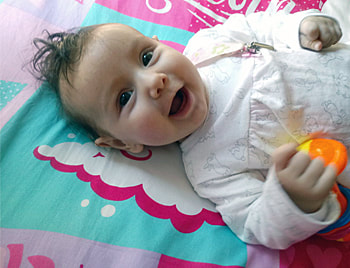Baby Of The Year Winner 2019
Learning Matters: Helping Your Child Learn
By Rachel Newcombe
Learning is a crucial aspect of children’s development and something that will remain with them throughout life. By helping your child learn in the early years, you’ll provide a firm foundation for the future and, hopefully, ignite a passion for knowledge and new skills.
Helping Babies Learn
The learning process begins as soon as babies are born. Even though they’re not able to communicate verbally with you, the simple things, like talking, saying nursery rhymes or singing, all help build up a gradual recognition of words, sounds and communication and the connection between words and meaning.
Talk and sing to your baby whenever you can throughout the day – when you’re changing her nappy, feeding her, playing or giving her a bath. Brightly coloured books, mobiles and toys can help in the process. Although babies can seem more interested in chewing the toy or gazing aimlessly at things, the recognition will slowly be happening at some level.
When you’re out and about together, at shops, in the car, at a park or in the street, it’s also worthwhile pointing out objects, pictures or signs to your baby, as every tiny action helps.
Toddlers and Pre-Schoolers
Toddlers and pre-schoolers learn through play, so encouraging your child to play at home and with others, and be imaginative, helps greatly with their overall learning ability.
As children get older and begin to become more aware of letters or numbers on toys, read them out loud and explain what they mean. Regular reading sessions encourages an interest in books and helps build up their connection with pictures and words. It’s common for children to develop firm story and character favourites and eventually be able to fill in missing words in familiar sentences.
At this age, young minds will be developing and children often being ultra curious and keen to know about anything and everything! Be prepared for a barrage of questions and be keen to answer them as much as possible, even if you’re tired of hearing constant, ‘Why’s?’ or, ‘How’s?’
Asking children questions is just as important as giving them answers, and it aids in the development of simple problem solving skills. Learning should be integrated into part of daily life, so it becomes something you play with when you’re at home, out and about, shopping or visiting places.
Find ways of using word and number games at home, such as putting magnetic letters on the fridge so they can be moved around to begin to form simple words or magnetic numbers that can be counted to help number knowledge. When you’re out shopping, encourage children to read food packets or signs, play games like I Spy when you’re in the car or develop basic counting games, like counting the number of pairs of shoes or socks you have.
Games such as Let’s Pretend add an extra learning dimension, by improving young imaginations and aiding all round skills. Plus, activities such as colouring in or painting help with colour identification and general craft abilities.
Primary Age Children
Once your children are at school, it’s just as vital to continue helping them learn at home. Although they’ll be busy developing lots of new skills at school, it’s helpful to continue to encourage regular reading habits and other learning. Bedtime is a good time to read a story, or you could make family trips to the local library part of your regular routine.
Children benefit from being supported with their studies, so be available for them to talk about what they’re learning or ask for help with queries or homework. Continue to provide a positive attitude to all forms of learning and make use of time at the weekend and in the holidays to take time out and explore new experiences, as everything contributes to their knowledge base.
Above all, learning should be fun – both for you and your children. So enjoy all you do and share and hopefully it will provide lasting foundations for your children.
Other Learning Ideas
* Encourage children to write and illustrate their own stories.
* Experiment with weighing and measuring objects or water.
* Create simple counting games.
* Sing songs and make up your own together.
* Use music to help children develop a sense of rhythm.
* Make masks and act out scenarios.
* Use interactive computer games to build up simple skills.
* Dance, exercise and have fun outside.
* Go on family nature trails.
* Cook together and have fun baking cakes.
By Rachel Newcombe
Learning is a crucial aspect of children’s development and something that will remain with them throughout life. By helping your child learn in the early years, you’ll provide a firm foundation for the future and, hopefully, ignite a passion for knowledge and new skills.
Helping Babies Learn
The learning process begins as soon as babies are born. Even though they’re not able to communicate verbally with you, the simple things, like talking, saying nursery rhymes or singing, all help build up a gradual recognition of words, sounds and communication and the connection between words and meaning.
Talk and sing to your baby whenever you can throughout the day – when you’re changing her nappy, feeding her, playing or giving her a bath. Brightly coloured books, mobiles and toys can help in the process. Although babies can seem more interested in chewing the toy or gazing aimlessly at things, the recognition will slowly be happening at some level.
When you’re out and about together, at shops, in the car, at a park or in the street, it’s also worthwhile pointing out objects, pictures or signs to your baby, as every tiny action helps.
Toddlers and Pre-Schoolers
Toddlers and pre-schoolers learn through play, so encouraging your child to play at home and with others, and be imaginative, helps greatly with their overall learning ability.
As children get older and begin to become more aware of letters or numbers on toys, read them out loud and explain what they mean. Regular reading sessions encourages an interest in books and helps build up their connection with pictures and words. It’s common for children to develop firm story and character favourites and eventually be able to fill in missing words in familiar sentences.
At this age, young minds will be developing and children often being ultra curious and keen to know about anything and everything! Be prepared for a barrage of questions and be keen to answer them as much as possible, even if you’re tired of hearing constant, ‘Why’s?’ or, ‘How’s?’
Asking children questions is just as important as giving them answers, and it aids in the development of simple problem solving skills. Learning should be integrated into part of daily life, so it becomes something you play with when you’re at home, out and about, shopping or visiting places.
Find ways of using word and number games at home, such as putting magnetic letters on the fridge so they can be moved around to begin to form simple words or magnetic numbers that can be counted to help number knowledge. When you’re out shopping, encourage children to read food packets or signs, play games like I Spy when you’re in the car or develop basic counting games, like counting the number of pairs of shoes or socks you have.
Games such as Let’s Pretend add an extra learning dimension, by improving young imaginations and aiding all round skills. Plus, activities such as colouring in or painting help with colour identification and general craft abilities.
Primary Age Children
Once your children are at school, it’s just as vital to continue helping them learn at home. Although they’ll be busy developing lots of new skills at school, it’s helpful to continue to encourage regular reading habits and other learning. Bedtime is a good time to read a story, or you could make family trips to the local library part of your regular routine.
Children benefit from being supported with their studies, so be available for them to talk about what they’re learning or ask for help with queries or homework. Continue to provide a positive attitude to all forms of learning and make use of time at the weekend and in the holidays to take time out and explore new experiences, as everything contributes to their knowledge base.
Above all, learning should be fun – both for you and your children. So enjoy all you do and share and hopefully it will provide lasting foundations for your children.
Other Learning Ideas
* Encourage children to write and illustrate their own stories.
* Experiment with weighing and measuring objects or water.
* Create simple counting games.
* Sing songs and make up your own together.
* Use music to help children develop a sense of rhythm.
* Make masks and act out scenarios.
* Use interactive computer games to build up simple skills.
* Dance, exercise and have fun outside.
* Go on family nature trails.
* Cook together and have fun baking cakes.


